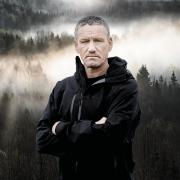The 10-day Sidmouth Science Festival, returns this month,and there are plenty of reasons to visit, says one of its organisers, Elizabeth Bramley
Hands-on experiments
The variety of activities on ensures that there’s something for everyone, from budding chemists and engineers to those interested in art and environmental issues. Super Science Saturday is a good day to go for a huge range of hands-on activities including chemistry demonstrations, investigating light and rainbows, maths challenges, making CD cars, a tornado in a bottle, balloon hovercrafts and kites, all things motors and meet the creepy crawlies. It’s a wonderful opportunity for families and individuals, all those with a curious mind, to dive into science through active participation.
Fossils and more
Another strong focus on Super Science Saturday is geology and we’ll be looking at geological themes, making it particularly relevant to the Jurassic Coast's rich paleontological history. Talks and presentations include reconstructing past climates using data from the longest-living animals and the recent discovery of the Pliosaur Skull in Dorset. These talks will provide fascinating insights into the Earth's history and the region's significant fossil discoveries. We have interactive games and fossil handling to help you learn more about palaeontology and the microscope displays give close-up views of rock samples, which can reveal intricate details about their composition and formation.

Artificial Intelligence and machine learning are technologies that are rapidly transforming various aspects of our lives, from the apps we use daily to advancements in medical diagnostics and ethical considerations. We have an illuminating afternoon looking at how they are shaping our future, with talks by university lecturer Dr Mostapha Kalami Heris and software researcher and engineer Dr Michelle Fabienne Bieger, ending with a Q&A session.
Listen to a talk or take a walk
Talks by a host of scientists take place throughout the week covering both local and national topics including a special focus on health, looking at brain health research and also what happens to our muscles as we age. There’s a talk on historical racism in medicine and overcoming medical disparities, and we look at sports science and nutrition. Other varied topics this year are: heat pumps and moisture management in our homes; the storms that hit Sidmouth in 1894, 1994 and 2024; Devon’s pioneering technologists, and tackling plastic waste issues.
You can join a visit to Devon Fire and Rescue HQ in Exeter to meet the Urban Search and Rescue team and learn how they prepare for and respond to emergencies. Then there’s the expert-led walks. How about a Sidmouth geology walk exploring its connection to the Jurassic Coast? Or a history walk around the Norman Lockyear Observatory?
Learn about biodiversity
One day is dedicated to exploring and learning about biodiversity. We investigate how flooding affects river landscapes, and take a look at ways to protect and enhance the River Sid and there are some field trips to investigate the fascinating world of ferns and lichens. It’s a day that combines education with real-world exploration and will lead to a deeper appreciation of the complexity and importance of biodiversity, particularly in river ecosystems and these plant species.
All things robotic
It’s also Robot Day on Saturday 12, with a robot workshop joined by visiting robots from the University of the West of England. This immersive and interactive event offers both theoretical knowledge and practical experience in robotics. It’s a fantastic way to dive into the world of robotics, learn new skills, and see how robots are transforming various industries.

The packed Family Fun Day at the Norman Lockyer Observatory on our last day offers a mix of fun and educational activities all with an astronomical theme.
Have a go at telescope viewing to explore the stars, planets, and other celestial objects; or go to a planetarium show, an immersive experience, teaching visitors about our galaxy, constellations, planets, and the broader universe.
Learn about Norman Lockyer, a significant figure in astronomy, and his contemporaries, delving into their contributions to the field and their discoveries. You can have a go at building and launching your own model rockets, learning about basic physics and engineering.
Build the Fastest Jet Car is a creative engineering challenge where participants make a jet car, using aerodynamics, streamlining its shape and adding accessories. It’s a great way to introduce principles of physics and engineering in a hands-on manner. For younger children there is storytelling and owls - a bit of nature mixed in with the space theme, featuring live owls and information about their species and habits.
Sidmouth Science Festival runs from Friday 4 until Sunday 13 October. Most events throughout the week are free, but there is an entry fee for the Family Fun Day.
For all details about the full programme, check the website.
sidmouthsciencefestival.org



























